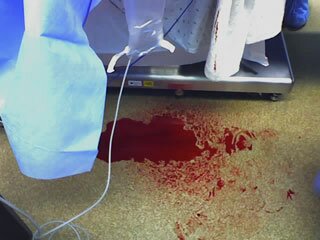Sunday, January 29, 2006
Influenza Map--through Jan. 14, 2006
-
Printer Friendly|#| Trackback

Tuesday, January 24, 2006
No Trasylol For Me or My Patients, Please
-
Printer Friendly|#| Trackback
Trasylol (Aprotinin) is a very expensive drug used during many kinds of cardiac surgery to reduce blood loss. In today's print edition of the NEJM (but not online yet) is a very important article by Dennis Mangano (very, very smart anesthesiologist) which shows an "association between aprotinin and serious end-organ damage" including doubling the risk of renal failure requiring dialysis, a 55% increase in the risk of MI or heart failure, and a near doubling of the risk of stroke or encephalopathy. The good news is that there are alternative drugs which cost one tenth as much and are also very good at reducing the need for blood transfusion. More soon....
Saturday, January 21, 2006
In advocating for patient safety, be forceful but not 'disruptive'
-
Printer Friendly|#| Trackback
Is whistleblowing worth it?
"What would you do if you discovered that conditions at your hospital posed a threat to patient safety? Let's say you reported the problem to your supervisor, and got no response. Would you then go to the hospital's administrator or CEO? Say you do, but he also refuses to deal with the problem. Then what? Would you file a formal report, or contact state or federal health officials?
If you do decide to blow the whistle, chances are you won't be rewarded for your efforts. In fact, you're more likely to be labeled a troublemaker or "disruptive physician." And if you persist in pursuing your cause, you could risk losing your staff privileges or your job. "
Can damage caps influence premium growth and physician supply?
-
Printer Friendly|#| Trackback
The Impact of Caps on Damages: How are Markets for Medical Liability Insurance and Medical Services Affected?
"[This report] provides a summary of research on the impact of caps including those on punitive and total damages in addition to those that apply only to non-economic damages. Our focus is on those papers that employ statistical techniques to control for potentially competing explanations of changes that are observed when simple descriptive statistics are used."
and concludes
"the body of research on the impacts of tort reform shows that caps have resulted in lower growth in medical liability losses in states that passed caps than in states that did not. The more recent literature on premium effects has found that caps result in lower premium growth. And, two very recent papers based on sufficiently many years of the AMAâs Masterfile data have found that non-economic caps and direct tort reforms more generally have a positive effect on the number of physicians per capita in a state."
Insurance Profits Don't Explain Malpractice Crisis
-
Printer Friendly|#| Trackback
The American Medical Association has released a new article which takes to task the so-called 'Angoff Report' which claimed that the medical liability insurance crisis is caused by insurance companies booming profits, overcharging physicians for coverage, and ballooning surpluses. It refers to two subsequent analyses which point up the flaws in the approach used by Angoff. Revised analysis shows the growth rate of insurance company surpluses was only 3.9% per year, and they were profitable in only one year (2004) when they made 5%
Thursday, January 19, 2006
Or Their Designee...
-
Printer Friendly|#| Trackback
If you read your consent for surgery, you'll see those words right after your surgeon's name. Maybe you've noticed them. Probably you haven't.
Ghost surgery is defined as "substitution of an authorized surgeon by an unauthorized surgeon or the allowance of unauthorized surgical trainees to operate without adequate supervision". Now, that definition is sufficiently vague to allow all manner of stuff to go on, but I would wager that if you asked the patient wether they were under the impression their surgeon would do the entire surgery, that they would say 'yes.' If I ask surgeon W to do my surgery, I'd like surgeon W to sew the skin closed, too. Residents can practice closing just fine in partial-task simulators.
Wednesday, January 18, 2006
Anesthesia Blood Loss
-
Printer Friendly|#| Trackback
Anesthesia-related blood loss almost never exceeds surgical blood loss...but it can. I recently had a case where the IV tubing became disconnected from the IV hub during a case. The blood pressure cuff was on the same arm, and the intermittent tourniquet effect of the cuff cycling served to increase venous pressure sufficiently to cause blood to flow backward and out the now disconnected IV.

But wait, there's more. The patient was receiving the medication that kept her asleep through her IV and the disconnect put her at very real risk of waking up or having awareness in the middle of her surgery. This apparently did not happen in this case based on my interview of the patient in the recovery room, but it surely could have.
This misadventure would have been entirely avoided by the use of IV tubing with a locking hub (often called a Leur-Lock connector) connecting the IV tubing to the IV hub. In our case, someone decided the locking connectors were not worth the extra cost and our connections were just slip fit (no lock). How many times should this happen before the equipment is changed?
This has happened many times to my colleagues and I (though usually not with such blood loss), each time we complained, were told it was being looked in to, but kept getting the same connectors. I took the above rather striking photograph to some clinical managers, who agreed we needed to change, and said that they had already ordered the new tubing. Until it arrives, I'm starting IV's myself so that I can use locking connectors.
Wednesday, January 11, 2006
Medpundit Looks At His Financials
-
Printer Friendly|#| Trackback
Ugh: I just spent the better part of the afternoon...:
"Ugh: I just spent the better part of the afternoon doing my least favorite task - reveiwing the financials of my practice. It doesn't look pretty. With Congress electing to decrease my pay by 4%, and my malpractice premium set to increase by 30% you can see it's not going to be a good year. The cost of supplies has been steadily going up, too, as have the cost of services. My medical waste haulers upped their fees by 20% in the past six months due to rising gas prices.
The Medicare cut may not sound like much, but it translates into a loss of about $2-3 per patient visit. And it isn't just limited to Medicare patients. Insurance companies base their rate of reimbursement as a percentage of Medicare fees. They might, say, pay 110% of whatever the fee Medicare pays. A practice that sees 25-30 patients a day will make $50-$90 less a day in 2006. That adds up quickly. Assuming a five-day work week, that adds up to $13,000 to $23,000 less over the course of the year. And despite what you might read in the newspapers, the majority of patients who pass through a doctor's office have health insurance - so the cut goes across the board.
How does that translate into day to day life? It means that my staff didn't get a cost of living raise this year. It means that I'll have to drop their health insurance if the premiums increase. And it means that I'm working harder - double booking patients when I can and adding an extra half day to my work week. Hopefully, I'll break even and avoid a decline in my own wages."
Wednesday, January 4, 2006
Antibiotic Resistance In Terms I Can Understand
-
Printer Friendly|#| Trackback
Penicillin and Amoxicillin's days are numbered
"Researchers from the University of Rochester started with the analysis of data from 11,426 children who has suffered a common throat infection.
They found that 25 per cent of children given penicillin, along with 18 per cent given amoxicillin treatment needed further treatment within weeks.
The data, taken from 47 studies from the past 35 years looked at the effectiveness of various drugs on treating strep throat in children.
Additional results revealed that of those given older-generation cephalosporin antibiotics, 14 per cent had to return for more treatment, while just 7 per cent prescribed newer versions like cefpodoxime and cefdinir, given for just four or five days, had to go back to the doctor. "
Monday, January 2, 2006
Baxter Moves Ahead With Generic Sevoflurane
-
Printer Friendly|#| Trackback
Baxter moves ahead with drug despite fight (Chicago Sun-Times):
"Unfazed by a continuing legal battle with Abbott Laboratories , Deerfield-based Baxter International will launch its generic inhaled anesthetic sevoflurane in the United States and Japan in the first half of this year."
[Via Yahoo Search: anesthesia]
Sunday, January 1, 2006
Prilosec and C.Diff?
-
Printer Friendly|#| Trackback
Reading a blog far afield of medicine, then to the Washington Post, I cam across an interesting nugget on C. Diff. The JAMA published an article on December 21, 2005 titled Use of Gastric AcidâSuppressive Agents and the Risk of Community-Acquired Clostridium difficileâAssociated Disease [abstract]. In two population-based case-control studies:
" The incidence of C difficile in patients diagnosed by their general practitioners in the General Practice Research Database increased from less than 1 case per 100 000 in 1994 to 22 per 100 000 in 2004. The adjusted rate ratio of C difficileâassociated disease with current use of proton pump inhibitors was 2.9 (95% confidence interval [CI], 2.4-3.4) and with H2-receptor antagonists the rate ratio was 2.0 (95% CI, 1.6-2.7). An elevated rate was also found with the use of nonsteroidal anti-inflammatory drugs (rate ratio, 1.3; 95% CI, 1.2-1.5). "
A teleconference is planned for January 18th to discuss these results as part of the new Author-in-the-room series.
QA On New Medicare Part B Prescription Drug Plan
-
Printer Friendly|#| Trackback
Deconstructing drug plan
- Who is eligible for the new Medicare drug benefit?
- What does the basic Part D plan include?
- Do I have to enroll in a Medicare drug plan?
- Do I have to decide today?
- What if I miss the deadline?
- My drug costs are really low and I don't have any coverage. Do I really need this?
More at http://www.medicare.gov/pdphome.asp
Wednesday, December 28, 2005
Gastric Bypass Surgeries Soaring (HealthDay)
-
Printer Friendly|#| Trackback
Gastric Bypass Surgeries Soaring (HealthDay):
"HealthDay - TUESDAY, Dec. 20 (HealthDay News) -- The number of gastric bypass and other bariatric surgeries conducted in the United States more than quadrupled between 1998 to 2002, from 12,775 procedures to 70,256, researchers report."
And from 2002 to the present, I'm sure they've continued to go up. Would I have one? Ask me when I'm 400 pounds and have tried other methods of weight loss without sustained results...
[Via Yahoo! News: Health]
Epocrates Online Free
-
Printer Friendly|#| Trackback
A reminder from The Palmdoc Chronicles that Epocrates Online Free is online and, well, free.
Medscape CME: Women With Migraine
-
Printer Friendly|#| Trackback
Women With Migraine: Effective Strategies for Positive Outcomes:
"Migraine is a female-skewed disorder affecting women about 3 times more often than men. Learn about common diagnostic errors in migraine and how triptans are improving symptoms for many sufferers. (CME)"
As an aside, I have had very good success treating perioperative migraines with IV metoclopramide (reglan).
[Via Medscape Headlines]


![]()